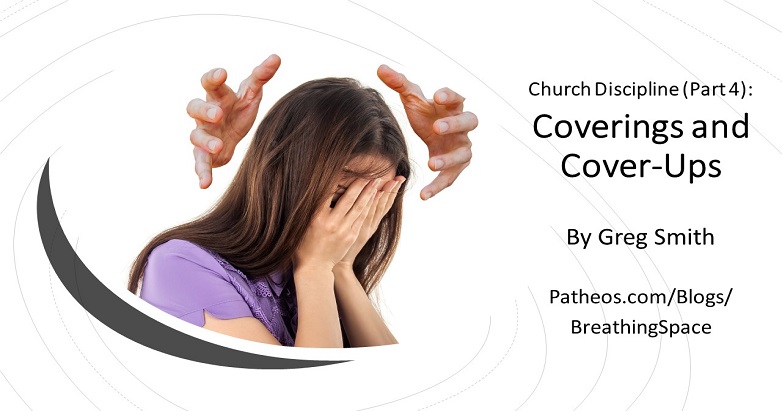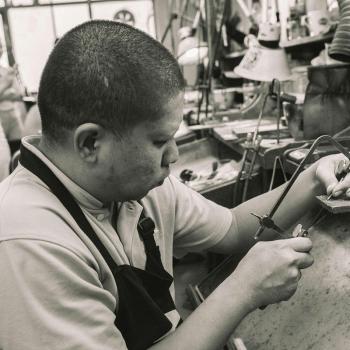The Church often uses internal discipline to cover up crime.

Because the church believes itself a spiritual authority (rather than influence) in society, it oversteps it’s bounds with church discipline. So far in this series, I’ve talked about how Jesus’s words in Matthew 18 have been twisted into an excuse for spiritual bullying. We’ve seen how Paul’s pharisaical notion that church leaders should be God’s morality police. We’ve deconstructed the doctrine of spiritual covering that allows excommunication to be a threat. Today we will look at perhaps the darkest side of church discipline when coverings become cover-ups.
It Happened Again
It happened again. Another case of a church treating criminal misconduct as moral violations and managing them internally. I could cite an example, but it happens so frequently that by the time this is published, another case will come to light. First it was the Roman Catholic Church. Then it was the Southern Baptist Convention. Time after time, and in many churches and denominations, religious leaders decide to bring someone under church discipline for “sexual sins” instead of reporting them to law enforcement for criminal abuses. They do this for three reasons:
- Fearing bad press, church boards and denominational authorities choose to handle embarrassing situations internally. But these things have a way of leaking out to the public. The church gets a black eye, and the victim gets no justice.
- Sometimes it isn’t bad press, but arrogance on the part of the church, which causes a cover-up. Leaders believe that eternal consequences are more important than temporal justice. So, they decide to manage crimes as if they are purely spiritual matters. This protects violators from earthly retribution and shames the victim into silence.
- Other times, the fraternity of deacons, elders, and other leaders causes them to sweep accusations under the rug. Men in power choose to protect their brothers rather than allow victims a voice. The #MeToo movement ought to be particularly strong in the church. Unfortunately, the strength of the patriarchy causes survivors to fear speaking out in church settings. This, of course, is by design.
Forgiveness Removes Liability
When the church forgets its call to be a spiritual influence (rather than authority) in society, it believes itself capable of replacing the criminal justice system. It has become so proficient at exercising church discipline over its people that it believes this is all that’s necessary when a member’s “moral failure” victimizes someone else. The church is often more interested in “restoring a fallen brother” than it is in hearing the stories of abuse survivors. It cares more about some hypothetical testimony of “victory over sin” than it cares about holding a perpetrator accountable. Instead, it emphasizes forgiveness that removes all liability, and stigmatizes the victim as unforgiving if they don’t re-engage in a toxic and dangerous relationship.
A New Word: Ecclesiocracy
There ought to be a word for the church usurping civil power. Hubris is when people aspire to be God—but what do you call it when religious institutions aspire to be a theocracy? Whatever word we create needs to cover the church’s overreach into political issues such as abortion rights and gay marriage. It also needs to include the church’s belief that it has the right to punish “moral failures” that are really civil or criminal violations. What do you call it when a religious institution takes on legal authority? It’s not theocracy, or the rule of God—because Jesus said His kingdom is not of this world. If it’s the rule of the church, maybe we should call it an ecclesiocracy.
The Danger of an Ecclesiocracy
When the Church decides itself to be better suited to oversee criminal cases and thus covers them up to deal with them internally, it practices ecclesiocracy. The Doctrine of Covering that says the Church is a spiritual shield for its members oversteps when it covers up crime and calls it sin. God has not called the Church to be either a spiritual or civil authority for society. Instead, the Church is supposed to be a spiritual and moral influence for its members. It is to be a guide for society, or as the Hebrew scriptures put it, a “light for the nations (Isaiah 49.6).” But the Church’s attempts at ecclesiocracy prove it that lacks the humility of Christ. Its cover-ups of crime demonstrate that some congregations are more committed to keeping people in darkness than turning on the light.
Next Time… “Church Discipline (Part 5): Discipling is Better Than Discipline”












